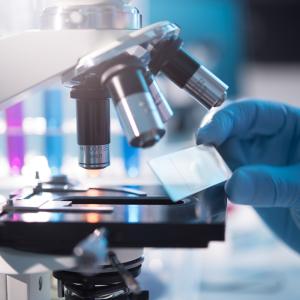Westbury resident Ken Raikowski, 65, hadn’t seen a doctor for more than 40 years when, in the summer of 2016, he suddenly didn’t feel well, waking up sluggish and in a cold sweat. He visited a general practitioner who felt his abdomen, ordered a CT scan, and upon reviewing it, referred him to a gastroenterologist who scheduled a colonoscopy.
In preparation for the procedure, Raikowski drank one gallon of the required liquid which then became obstructed, swelling in his abdomen. He was brought to NYU Winthrop Hospital’s emergency department where a surgical oncology team began a complex operation to repair Raikowski’s blocked intestine, and remove colon cancer that had spread to his bladder which the doctors discovered.
“A multidisciplinary approach was key to eradicating Ken’s cancer,” explains surgical oncologist Megan D. Winner, MD, who has extensive gastric and colorectal expertise. “It is rare to have a patient with a single problem that requires a single doctor. The treatment of cancer, in particular, has become increasingly complex because of advancements in treatment options, and it is a complex equation knowing how to apply exactly the right treatment at the right time.”
Anthony Corcoran, MD, NYU Winthrop’s director of urologic oncology and a leading expert on bladder cancer, was also part of Raikowski’s team. Together, Dr. Winner and Dr. Corcoran removed part of his small intestine, colon, bladder, and abdominal wall, including cancerous tumors and blockages while preserving the integrity of surrounding noncancerous organs and tissue.
To protect the ureter that drains the kidney, Dr. Corcoran dissected it from a tumor mass on the bladder. He then conducted a partial bladder resection before restoring the ureter to its natural position, which enabled Raikowski to maintain his quality of life with a functioning bladder.
Dr. Winner performed intricate surgery on Raikowski’s intestine and colon including a temporary ileostomy, in which an opening in the abdomen called a stoma allows waste to collect in an ostomy bag. Following his recovery from surgery, medical oncologist Prashanti M. Atluri, MD, administered Ken’s chemotherapy. Months later, once his treatments were completed, Dr. Winner reversed Raikowski’s ileostomy.
Two years later, Raikowski remains cancer-free, and thankful for the NYU Winthrop oncology team that saved his life. “They took me apart and put me back together,” describes Ken. “I have a new lease on life. I never experienced any major pain or discomfort, and I’m also grateful for that.”
Inspired by Dr. Winner’s survivorship presentation, Raikowski attends free weekly exercise programs for cancer survivors sponsored by nonprofit Strength for Life. “It’s important to consider the whole person when treating cancer,” says Dr. Winner, “At NYU Winthrop, we look at the possibilities offered through technology, surgery, and medicine but also integrate into our care psychological, emotional, and family and survivorship considerations.”
Raikowski hopes to make a difference in the lives of his family members. He has strongly encouraged his 37-year-old son to have his first colonoscopy early, knowing this preventive screening just might save his life.

